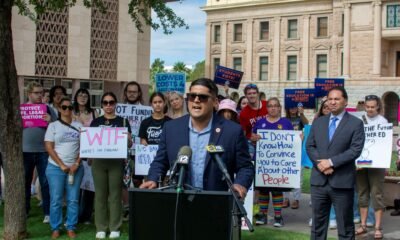AOM
Obesity: A Chronic Crisis Demanding Medicare’s Urgent Action

Obesity has reached alarming levels in the United States, impacting nearly 93 million adults today and expected to climb to 120 million within just five years. This health crisis is closely linked to our food supply, rife with harmful chemicals and additives. Many of these substances are prohibited in other nations, yet they remain legal in the U.S. Immediate action is crucial, especially for residents of Arizona and for seniors on Medicare.
Leo Biasiucci, a state legislator, emphasizes the urgent need to address obesity. He highlights that tackling this issue not only enhances individual health but also mitigates long-term healthcare costs that affect all taxpayers. Biasiucci advocates for Medicare to classify obesity as a chronic disease and to cover necessary treatments. Congressman David Schweikert from Arizona vocalizes strong support for anti-obesity medications (AOMs), stressing that addressing this epidemic transcends party lines; it’s a pressing public health and economic challenge.
At the state level, Biasiucci has championed improved nutrition through initiatives such as removing artificial dyes from food and restricting soda purchases via SNAP benefits. While these measures are steps in the right direction, they are insufficient to resolve the obesity crisis. Many individuals, particularly seniors and those facing mobility challenges, may find that exercise isn’t feasible. For them, medications might be the only practical route to managing their weight.
Biasiucci advocates for Medicare to extend coverage to FDA-approved anti-obesity medications, recognizing obesity as a chronic condition that often cannot be managed solely through lifestyle modifications. Research suggests that broadening Medicare’s coverage for AOMs could yield savings of up to $700 billion over the next three decades by reducing expenses linked to obesity-related illnesses, including diabetes and heart disease.
Progress has been made under former President Trump, who supported measures for finalizing a rule from the Centers for Medicare & Medicaid Services to allow Medicare coverage for these medications. With Secretary Robert F. Kennedy Jr. now at the helm of the Department of Health and Human Services, ongoing scrutiny and safety will remain priorities as access to these treatments improves.
Biasiucci aligns himself with Congressman Schweikert and others advocating for solutions to this public health crisis. He insists that Medicare must include coverage for anti-obesity medications—not as substitutes for a healthy lifestyle, but as essential tools for those without alternatives. The health of millions of Americans, along with the sustainability of the healthcare system, rests on this imperative.
Leo Biasiucci serves as a Republican member of the Arizona House of Representatives for Legislative District 30 and is the chairman of the House Transportation Committee.


















